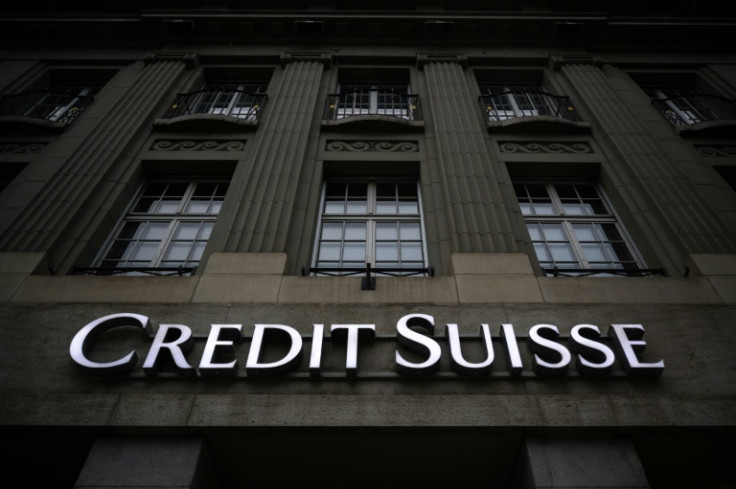Credit Suisse: A Bank Sunk By Scandals

Credit Suisse was a pillar of Swiss banking that rapidly collapsed, its foundations fatally undercut by repeated missteps that left it shaky when storms in the banking sector began swirling.
One of 30 banks worldwide deemed too big to fail, its share price collapsed on Wednesday and before Sunday was out, its remains were being taken over by domestic rivals UBS.
It had been seen as the weakest link in the chain and blew over like a house of cards once fears of a domino effect began bubbling up after the collapse of two US lenders.
Here is an overview of the woes that brought down Credit Suisse:
The catalogue of troubles began with the 2021 collapse of Greensill, a British financial firm specialised in short-term corporate loans via a complex and opaque business model.
Greensill's collapse threw a number of companies into difficulty -- none more than Credit Suisse, which was particularly heavily invested in the firm.
In March 2021, after Greensill declared insolvency, Credit Suisse closed four connected funds in which around $10 billion had been invested.
Swiss financial regulator FINMA concluded that the bank "seriously breached its supervisory obligations" and ordered "remedial measures."
Just four weeks after the Greensill collapse, Credit Suisse was rocked by the implosion of US hedge fund Archegos, which cost the bank more than $5 billion.
In October 2021, the bank was fined $475 million by US and British authorities after it was caught up in a bribery scandal in Mozambique involving loans to state-owned companies.
The credits, granted between 2013 and 2016, were supposed to finance maritime surveillance, fishing and shipyard projects, but were partly diverted for bribes.
The bank agreed with the British authorities to cancel the $200 million owed by the southeast African country, which was plunged into a serious financial crisis.
Former Lloyds Banking Group chief Antonio Horta-Osorio was brought in as Credit Suisse chairman in April 2021, pledging to put better risk management at the heart of its culture.
Less than nine months later, he resigned after it emerged he had violated Switzerland's Covid quarantine rules.
A media investigation published in February 2022, dubbed "Suisse Secrets", alleged that the bank had held billions of dollars of dirty money for decades.
The probe, coordinated by the Organized Crime and Corruption Reporting Project, said leaked information on more than 18,000 bank accounts dating back to the 1940s showed Credit Suisse held more than $8 billion in the accounts of criminals, dictators and rights abusers.
The bank rejected the findings, saying they were "based on partial, inaccurate, or selective information taken out of context".
At the end of March 2022, a Bermuda judge ruled that former Georgian prime minister Bidzina Ivanishvili had suffered a loss of $553 million due to failures by Credit Suisse Life Bermuda, a Credit Suisse affiliate, to fulfil its fiduciary duty.
The case stemmed from the actions of Patrice Lescaudron, a former star banker at Credit Suisse sentenced by Swiss authorities to five years in prison in 2018 on charges of fraud and forgery. Lescaudron committed suicide in 2020.
The court found that the Credit Suisse affiliate "was prioritising the revenues Mr Lescaudron generated for Credit Suisse over the interests of its clients".
In June 2022, Credit Suisse was slapped with a $2 million fine in a money laundering case linked to a Bulgarian cocaine network.
Switzerland's Federal Criminal Court ruled that the bank had failed to take steps to prevent money laundering by the criminal organisation, deeming it guilty of breaching its corporate responsibility in a case dating back to 2007 and 2008.
In October 2022, Credit Suisse said it would pay $495 million to settle a row with the US state of New Jersey over mortgage-backed securities dating back to the 2008 financial crisis.
In France that same month, it agreed to pay 238 million euros to avoid prosecution on money laundering and tax fraud charges brought in 2016 over undeclared accounts held by French nationals.
Credit Suisse was forced to postpone its annual report, which had been scheduled to be published last week, after a last-minute call from the US Securities and Exchange Commission over revisions made to cash-flow statements for 2019 and 2020.
When it finally released the report on Tuesday, it acknowledged "material weaknesses" in its internal controls.
Following fears of contagion from the collapse of two US banks, comments from Credit Suisse's main shareholder Wednesday that it would not invest more money in the bank sparked market panic.
Within days, the game was up.
© Copyright AFP 2024. All rights reserved.



















